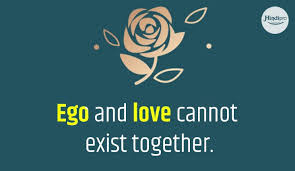Quote from true charm and Power of Vedanta
All our social, political and economic reforms are intended to provide for
food, clothing and shelter and thus remove obstacles in the path of physical
existence . But there is another struggle that is going on for the maintenance of
the ego. Man has not yet learnt the art of disburdening himself of the struggle
the ego tires to maintain its identity
its superiority-in the family background where it is born, in its working environment,
in the midst of friends and colleagues, in other forms of social relationships.
We can imagine the maze of problems that can arise from this struggle. Existentialist
writers show great sill in depicting this struggle most impressively and movingly.
Bertrand Russell remarks in his book. The Conquest of Happiness. What people
mean, by the struggle for life is really the struggle for success. What people
fear, when they engage in the struggle is not that they will fail to get their
breakfast next morning, but they will fail to outshine their neigbours.

The Gita has a lot in common with physics
Speaking Tree India, Spirituality, TOI
By GS Tripathi

Concept of indestructibility occupies a significant space in both. While
in the Bhagwad Gita the soul is described as indestructible, in physics,
Einstein’s relation between mass and energy suggests that both are
indestructible. The difference is that the concept of indestructibility is
based on reason and experimentation in physics, whereas it is a matter of faith
in the Gita. Phase transformation is another aspect that is a part of both.
In the Gita it is described that the body transforms and passes through
different phases such as birth, childhood, adulthood, old age and death, and
each phase has its distinctness. Childhood is characterised by tenderness and
curiosity. Adulthood exhibits action, dynamism and energy. Old age shows
maturity, compassion and also decay.
Similarly, matter undergoes phase transformations and changes state from
solid to gaseous via a liquid phase. In the solid state, in addition, there are
instances of order-disorder transformations. Off and on, physicists predict
some exotic states. Their sustainability depends on how long they engage the
minds and experiments of physicists and other related scientists. Solids are
identified by their rigidity, while liquid and gaseous states are characterised
by fluidity. All these states have their respective equilibrium phases, free of
external and internal forces. Sometimes these states are disturbed naturally,
or artificially to explore something new.
According to the Bhagwad Gita, the equilibrium state is the sthitapragya
state in life. It is a force-free state, the ultimate state. Once a person
reaches this state, he is automatically enlightened. He conquers the dualities
of life. However, secluded enlightenment is of no use like gems in the deep sea
or flowers in a vast desert. Maybe it purifies the soul. However, it is of no
use if it is not dedicated to society’s welfare.
The Gita talks about things small and big, statics and dynamics, one and
many, light and darkness, infinities and zeroes. Physics also talks about these
things but with evidence.
Many physical ideas originate from conjectures and hypotheses. However,
these are accepted as laws only when confirmed by evidence through
experimentation and reason. True philosophers also emphasise reason. As Tagore
said, “Where a clear stream of reason is not lost in dreary sands of dead
habit.”
The Gita emphasises the principles of creation, preservation and
annihilation. Jagatguru Krishn affirms these principles many times in the Gita.
Physics is also based on these aspects. Both deal with many-body systems.
Explaining about ‘sat’ and ‘asat’, the Gita says that ‘sat’ never ceases to
exist, implying it is reality and ‘asat’ has no existence, that is, it is an
imagination. Physics too handles real and imaginary concepts, and arrives at
meaningful conclusions, substantiated by observations. However, there are
clear-cut boundaries between the two, and these should not be blurred by too
much correlation. The convergence is that both evoke deep thinking and are
sources of eternal excitement.
The writer teaches Physics at Berhampur University
IF HE EXIST
I drive joy there was a doctor in
Benaras who spent 7 minutes in the morning and evening for mediation on God.
Knowing this, his colleagues and friends laughed at him. One day they argued
that he was wasting 7 precious minutes on something, which he had been misled
into believing. The doctor replied, “Well, if God does not exist, I agree that
I am wasting 7 minutes a day. But, if He exists? I am afraid you are wasting
your entire lifetime. I prefer to waste 7 minutes rather than a lifetime. Why
should you grudge me the 7minutes joy that I derive 4m.-
ILLUSTRATED REVIEW : 7th heaven moment of
the IN ISL East Bengal no 7 scored a goal, Mumbai no 7 scored a goal









No comments:
Post a Comment